Jessica Binkley believes her choice to become a “Big” with Big Brothers Big Sisters of Flagstaff was the best decision she ever made because every moment she spends with her “Little” enriches both of their lives.
“I have learned so much from my Little,” she said. “I’ve learned how to recognize what’s important, how to forgive myself, how to get excited about puppies and ice cream, how to realize nothing’s impossible and nothing’s too big.”
Binkley, a graduate student in psychology at Northern Arizona University, along with six other NAU students, make up half of the Bigs volunteering in the STARS Mentoring Program, an innovative initiative designed to team up children of incarcerated parents with positive adult role models.
“Statistics show that children of prisoners are 70 percent more likely than their peers to end up in prison,” said CJ Penning, a senior social work major who also is coordinating the program as an intern. “The STARS program hopes to change these statistics; we want to keep these kids out of the criminal justice system and break the cycle.”
The STARS Mentoring Program, which is aided by a federal grant and overseen by the Pima Prevention Partnership, began in Tucson in 2001. Since then it has spread across Arizona, coming to the Flagstaff chapter of Big Brothers Big Sisters in 2006, Penning said.
Penning took over the program last October as part of her senior internship and since then the program has gone from 10 matches to 14, with a goal set for 20 matches by October.
“Bigs are good role models for these kids. They are there to model good life decisions and help them succeed,” Penning said. “The more healthy adults the kids have around them, the better able they are to make wise choices for their own lives.”
Binkley believes that in addition to facing the “normal” situations of childhood, many life experiences are different for children of incarcerated parents. By being a mentor, she is providing her Little with a stable adult figure while having fun in the process.
Because the NAU students who volunteer as Bigs make up 50 percent of the STARS mentors, Penning said they play a vital role in the program’s success.
“Working with NAU students has been a very positive experience,” Penning said. “The Littles like them because they are younger and ‘cooler.’ Additionally, the fact that they are pursuing a college degree means they can be great role models to kids who may not know anyone who has been to college.”
As a student herself, Penning believes she has learned invaluable lessons while working with Big Brothers Big Sisters of Flagstaff and coordinating the STARS program. She said the internship has taken all she has learned in her program and turned it into real-world knowledge.
“The most significant thing I have learned is how important prevention is because it seems to me that most of our efforts in this country deal with the problem after the fact,” Penning said. “While it is very important to provide services to those who are incarcerated, it is still more important to figure out how to stop them from being incarcerated in the first place. This program is one possible solution to that problem.”
Penning said she hopes the program continues to grow so it can reach out to more local children. One specific goal she has is to recruit more male Bigs because females volunteer more often than males, making it harder to place boys with male mentors.
“I think everyone who is a Big wishes there were more Bigs,” Binkley said. “That’s because we see our Littles’ faces every time we pick them up and know how much it means to them.”
For information on the STARS Mentoring Program, visit the Big Brothers Big Sisters of Flagstaff web site at www.bbbsf.com, e-mail Penning at CJ@bbbsf.com or call (928) 774-0649.



